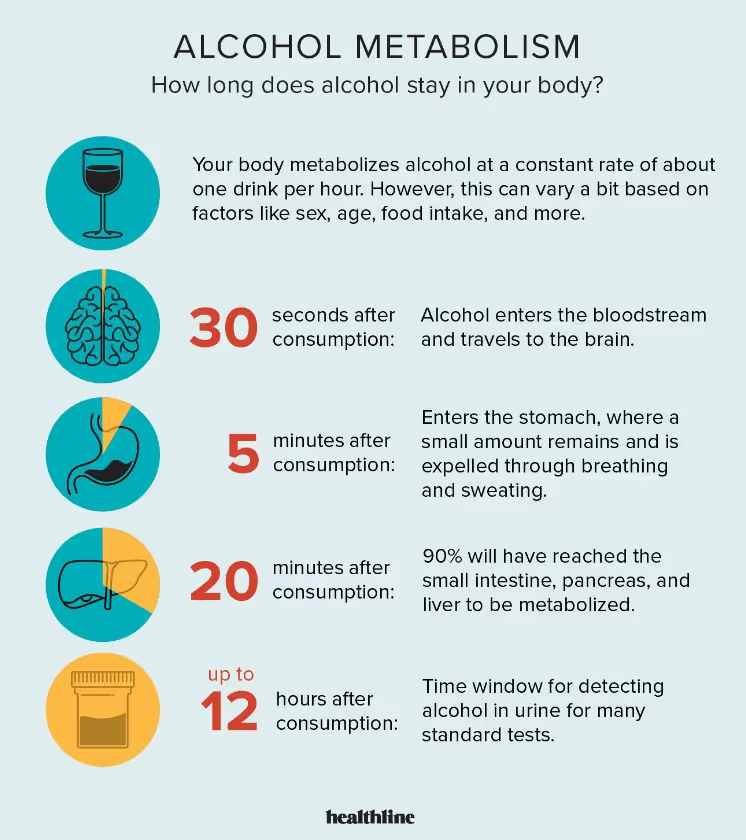How Long Does It Take Alcohol To Leave Your System?


We've all been there - a night out with friends, a few too many drinks, and the next morning you wake up feeling less than stellar. But how long does it take for alcohol to leave your system, and what can you do to help speed up the process?
How Alcohol is Processed by the Body
First, let's talk about how alcohol is processed by the body. When you drink alcohol, your liver works to break it down into a substance called acetaldehyde. From there, it is broken down further into acetate, which is then excreted from the body as waste.
The liver can process about one standard drink per hour. A standard drink is defined as 12 ounces of beer, 5 ounces of wine, or 1.5 ounces of liquor. However, this can vary depending on a number of factors, including your weight, gender, and overall health.
How Long Does it Take for Alcohol to Leave Your System?
So, how long does it take for alcohol to leave your system? The answer is not a simple one, as it can vary depending on a number of factors. However, on average, it takes about one hour for your body to process one standard drink.
If you've had more than one drink, you can use the following chart to estimate how long it will take for the alcohol to leave your system:
- 2 drinks: 2 hours
- 3 drinks: 3 hours
- 4 drinks: 4 hours
- 5 drinks: 5 hours
Again, these are just estimates, and your body may process alcohol more quickly or more slowly depending on a number of factors.

Factors That Affect the Rate That Alcohol Is Processed:
The rate at which alcohol is processed by the body can be influenced by several factors. Some of the most significant ones include:
Body weight
Generally speaking, people with higher body weights tend to process alcohol more quickly than those with lower body weights.
Gender
Women tend to have less water in their bodies than men, which means that they may process alcohol more slowly. Additionally, women typically have less of an enzyme called dehydrogenase, which plays a role in breaking down alcohol.
Age and overall health
As people age, their liver may not function as efficiently as it did when they were younger, which could impact how quickly they process alcohol. Overall health can also affect how quickly someone processes alcohol.
Food intake
Whether or not you've eaten recently can also impact the rate at which your body processes alcohol. Food slows down the absorption of alcohol into your bloodstream.
Medications
Some medications can interact with alcohol and slow down its processing. It's important to read labels and talk to a healthcare provider before drinking while on medication.
Stress levels
High stress levels can slow down the processing of alcohol. This is because stress hormones can interfere with the function of enzymes that break down alcohol.
It's important to note that the rate at which someone processes alcohol is highly individualized. Understanding these factors can help individuals make informed decisions about their drinking habits and stay safe while consuming alcohol.
How Long Does Alcohol Stay in Your Urine?
Determining how long alcohol stays in your system is a crucial piece of information, especially when it comes to urine tests. Alcohol can be detected in urine for up to 12-24 hours after consumption, but this detection window can vary depending on several factors.
The amount and type of alcohol consumed can significantly affect how long it stays in your system. Different alcoholic beverages have varying concentrations of ethanol, which can impact the duration of alcohol presence in the body.
It's also important to note that heavy drinkers or those with liver damage may take longer than 24 hours to eliminate alcohol from their bodies due to the effects of prolonged alcohol exposure on their liver function.
How Long Does Alcohol Stay in Your Blood?
Alcohol can be detected in the blood for a longer period than in urine. The amount of time it stays depends on various factors, including the amount and type of alcohol consumed, weight, age, gender, and metabolism rate.
On average, it takes about 1-2 hours for the body to process one standard drink. However, this time can vary depending on the factors mentioned above. Once the alcohol is absorbed into the bloodstream, it circulates throughout the body, and the liver breaks it down into acetaldehyde and then into acetate, which is eliminated as waste.
In general, alcohol can remain in the blood for up to 12 hours after consumption, but this detection window may vary. Note that breathalyzers measure a person's blood alcohol content (BAC), indicating how much alcohol is currently in their bloodstream.
How Long Does Alcohol Stay in Your Hair Folicies?
The question of how long alcohol stays in your hair follicles is a complex one. Unlike blood and urine tests, which can detect alcohol for several hours after consumption, hair tests can detect alcohol for up to 90 days or longer after the last drink.
This is because when you consume alcohol, it enters your bloodstream and eventually makes its way into your hair follicles. As your hair grows, the alcohol becomes trapped inside the shaft, leaving a permanent record of your drinking habits.
Hair tests are often used in legal and employment settings to detect long-term alcohol use. However, they are not foolproof and can produce false positives or false negatives depending on several factors such as the type of test used, the amount and frequency of alcohol consumed, individual metabolism rates, hair color and texture, etc.
How Long Does Alcohol Stay in Your Breast Milk?
Alcohol can also be passed on to a baby through breast milk, making it important for nursing mothers to be aware of how long alcohol stays in their system. The amount of time it takes for alcohol to leave breast milk is similar to the amount of time it takes for alcohol to leave the bloodstream.
On average, it takes about 2-3 hours for a single drink to clear out of breast milk. However, this can vary depending on several factors such as the mother's weight, age, and overall health. It's important for nursing mothers who choose to drink alcohol to plan accordingly and allow enough time for the alcohol to clear out of their system before nursing their baby.
It's recommended that nursing mothers wait at least 2 hours after consuming a single drink before breastfeeding. If more than one drink is consumed, waiting longer may be necessary. Alternatively, pumping and discarding breast milk during this waiting period can help reduce the amount of alcohol in the mother's breast milk.
How is Alcohol Measured in Your Body?
Alcohol is typically measured in your body through blood alcohol concentration (BAC) tests. A BAC test measures the amount of alcohol present in your bloodstream as a percentage by weight.
There are several ways to measure BAC, including breathalyzer tests, blood tests, and urine tests. Breathalyzers are the most common method and work by analyzing the amount of alcohol present in a person's breath.
It's important to note that different countries have varying legal limits for BAC while operating a vehicle or heavy machinery. In the United States, for example, it is illegal to drive with a BAC of 0.08% or higher.
Knowing how alcohol is measured in your body can help individuals make informed decisions about their drinking habits and avoid dangerous situations. It's always best to err on the side of caution and avoid driving or operating machinery after consuming any amount of alcohol.
What is a Standard Drink?
It's important to understand what constitutes a standard drink when it comes to measuring alcohol intake. A standard drink is defined as:
- 12 ounces of beer (5% alcohol content)
- 5 ounces of wine (12% alcohol content)
- 1.5 ounces of distilled spirits or liquor (40% alcohol content)
These measurements are based on the amount of pure ethanol present in each type of alcoholic beverage. It's worth noting that some beers and wines can have higher alcohol contents, and mixed drinks can contain significantly more than one standard drink.
Knowing what a standard drink looks like can help individuals keep track of their alcohol consumption and make informed decisions about how much they're drinking. It's also important to remember that the effects of alcohol can vary depending on factors such as weight, gender, and overall health, so it's always best to consume alcohol in moderation.
How to Speed Up the Process
If you're looking to speed up the process of alcohol leaving your system, there are a few things you can do:
- Drink plenty of water to help flush the alcohol out of your system
- Eat a healthy meal to help your body absorb the alcohol more slowly
- Get plenty of rest to give your body time to recover
It's also important to note that there is no guaranteed way to speed up the process of alcohol leaving your system. The best thing you can do is to drink responsibly and in moderation.
Takeaway
In conclusion, the length of time it takes for alcohol to leave your system can vary depending on a number of factors. On average, it takes about one hour for your body to process one standard drink. If you've had more than one drink, it can take several hours for the alcohol to leave your system.
If you're looking to speed up the process, there are a few things you can do, such as drinking plenty of water, eating a healthy meal, and getting plenty of rest. However, the best thing you can do is to drink responsibly and in moderation.
Sources:
- https://www.niaaa.nih.gov/publications/brochures-and-fact-sheets/alcohol-metabolism
- https://www.cdc.gov/alcohol/faqs.htm
- https://www.healthline.com/health/how-long-does-alcohol-stay-in-your-system
